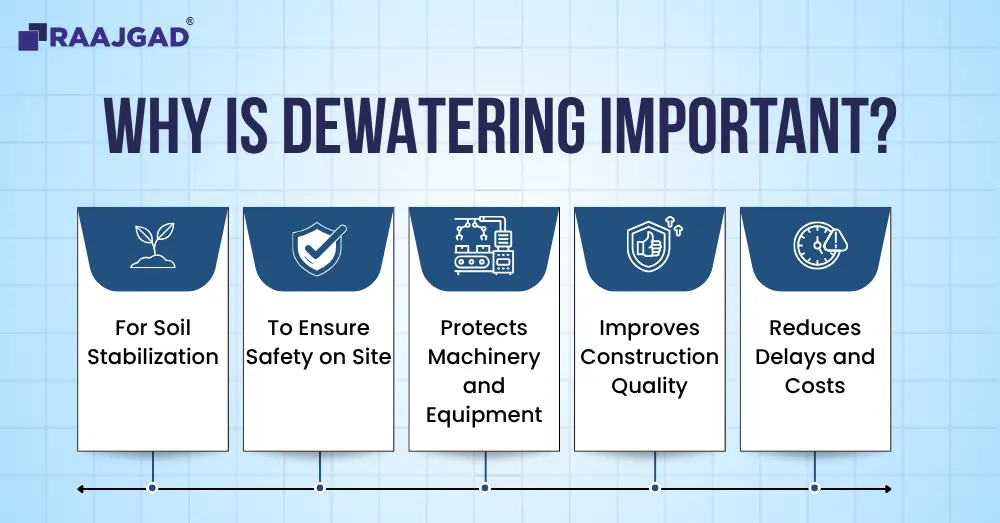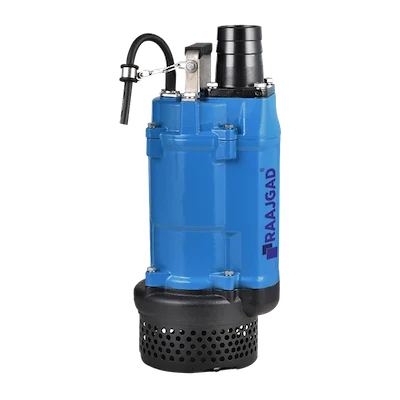Imagine building a multi-story building in an area with soil rich in moisture, and you are investing a large amount in the project. What are the chances that this project will be successful?
Not more than 20% even though you are lucky.
Do you know the reason?
Buildings in high-moisture soil areas have high chances of collapse due to reduced soil bearing capacity and shrinking of the soil. These factors can not only affect the foundation’s ability to support the structure, but also lead to cracks, tilting, and even collapse.
Hence, dewatering comes as the ultimate solution in this picture. Still not convinced?
Let’s take a closer look at what it is, why is dewatering important, and how it’s done.
What is Dewatering?
Dewatering refers to the process of removing water from an area that could be a construction site, an excavation, or an industrial area.
Whether it’s groundwater, waterlogged due to rain, or water that seeps in from nearby sources, dewatering works for all.
Dewatering can be done using a variety of methods, such as pumps, wells, or drainage systems. The primary goal of dewatering is to maintain a dry and stable work environment for workers, machinery, and materials, preventing accidents caused by waterlogging.
Without proper dewatering, sites can become flooded or unstable, which can cause major delays and safety risks.
When is Dewatering Done?
Dewatering is not something that happens at fixed intervals. In fact, it completely depends on the situation of the site. Whether workers are building the foundation of something, laying sewer lines, or working in areas with high water tables, dewatering is crucial to ensure the continuity of the project.
Here are some key moments when detwaring becomes essential:
1. Before Excavation:
At many sites, dewatering is done before the excavation starts. Dewatering before excavation ensures that the site is free from any water that could interfere with foundation work.
If the water table is high, there is a big water source nearby, or there has been recent rainfall, dewatering will be necessary to prevent the site from being flooded.
2. During Excavation:
As excavation work starts, there is a high chance that water can seep into the site from the surrounding soil. Here dewatering system can help to remove water to keep the worksite dry and prevent it from interfering with ongoing work.
3. After Heavy Rain or Flooding:
If a construction or mining site experiences a flood or heavy rainfall, then detwaring can be done to pump out excess water, making it safer to resume workings.
Why is Dewatering Important?

Now that we know what dewatering is and when it’s done, let’s have a look at why is dewatering important for construction and other projects.
1. For Soil Stabilization:
An excess amount of groundwater can saturate soil, turning it into a semi-liquid state and making it unstable as well. This condition of the soil can lead to the collapse of excavation walls or sloughing. It can also lead to devastation of the ground on which a foundation is to be built.
2. To Ensure Safety on Site
Dewatering is crucial to maintaining a safe working environment. If water accumulates, it can create slippery surfaces, making it hazardous for workers and other employees to move around and work in that particular area.
Additionally, water can also damage important site features like excavation depth or underground utilities, increasing the risk of accidents.
3. Protects Machinery and Equipment
Construction sites have a large number of machinery and equipment in working, and even a small amount of water or moisture can damage them. In addition, water and moisture can cause corrosion and electrical damage, leading to costly downtime and unplanned shutdowns.
4. Improves Construction Quality
Water can interfere with the quality of construction work. For example, when concrete is poured on wet ground, it might not set properly, which can weaken the structure over time. If you pour concrete on the dry ground, it will settle down easily.
Dewatering ensures that the ground remains dry, so materials like concrete and asphalt set properly and achieve the desired strength and durability. By maintaining a dry work environment, dewatering helps ensure that the final product is of high quality.
6. Reduces Delays and Costs
Water-related issues can cause significant delays in any project. Whether it’s waiting for water to drain or dealing with unexpected floods, the time spent managing water can lead to costly delays.
Dewatering systems help eliminate these issues, allowing the project to progress on schedule. This not only saves time but also reduces unexpected costs, making dewatering an essential cost-saving measure.
Conclusion

Dewatering is a very crucial part of construction, excavation, and mining operations. It ensures that the site remains stable, safe, and ready for work, protecting both employees and machinery working on the site.
If you’re planning a project that requires effective dewatering, it’s important to choose the right systems and equipment. Raajgad Pump offers high-performance pumps and dewatering solutions that ensure the job is done right, on time, and within budget.




